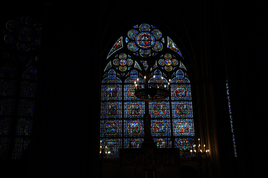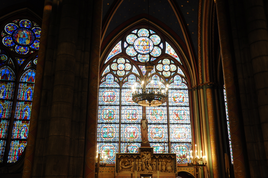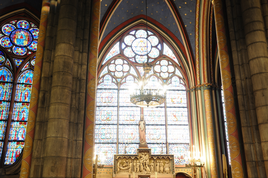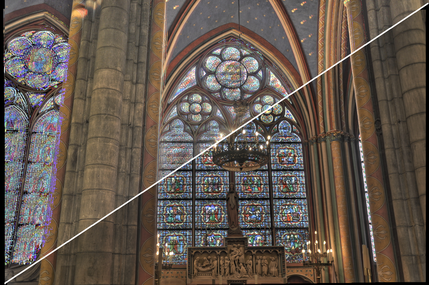
Welcome to the homepage of the lecture
Advanced Image Analysis
Summer Term 2011
Home
About Us
People
Teaching
Research
Publications
Awards
Links
Contact
Internal
Prerequisites – Synopsis – Contents – Assignments – References
Advanced Image Analysis
Lecturers:
Henning Zimmer,
Dr. Andrés Bruhn
Office hours: Friday, 14:15 - 15:15
Summer Term 2011
Lectures (2h) with programming/theoretical exercises (2h)
(6 credit points)
Lectures: Thursday 10-12 c.t., Building E 2.4 (Math building), Seminar Room 5
Tutorials: 2 hours each week
Monday, 16-18 c.t.
Tutorials: Building E1.3, Seminar Room 0.15 (theory)
Tutorials: Building E1.3, Cip-Pool 104 (programming)
First tutorial: Monday, May 2, 2011
NEWS:
05/10/2011: Results of the second written exam are online. See below for details!
12/08/2011: Results of the first written exam are online. See below for details!
15/06/2011:
No lectures on Thursday, June 23 and June 30.
No tutorials on Monday, June 27 and July 4.
08/06/2011: No tutorial on Monday, June 13! (public holiday)
26/05/2011: No tutorial on Monday, May 30
and no lecture on Thursday, June 2!
10/05/2011: Sample solution for assignment P2 can be found
here.
28/04/2011: Registration closed!
19/04/2011: Posted exam dates.
04/04/2011: Course homepage online. Important news will be posted here and also on the mailing list.
Example - Freehand High Dynamic Range (HDR) Imaging



|

|
| Exposure series. | Tone mapped HDR reconstruction without and with alignment. |
Requires undergraduate knowledge in mathematics (e.g. ''Mathematik für Informatiker I-III'') . Basic knowledge in image processing and computer vision is recommendable. The lectures will be given in English.
In this lecture, we will discuss advanced topics in the fields of image processing
and computer vision.
Most of the presented methods fuse the information from several images in order
to produce a somwhat enhanced image. Examples for such techniques are super-resolution,
high dynamic range (HDR) imaging, extended depth of field (focus stacking) or panorama
stitching.
Additionally, we will also discuss recent advances in hardware, e.g. the advent of
affordable depth cameras.
This class is particularly useful for those students who wish to
to pursue a diploma or master thesis in our group.
Programming excercises and theoretical assignments are offered as part of the tutorials.
The regular attendence of these excercises is requirement for admission to
the exam.
| Date | Assignment |
|---|---|
| 09/05 | P2 - Programming Assignment Sources | 19/05 | P4 - Programming Assignment Sources |
| 20/06 | P6 - Programming Assignment Sources |
| 18/07 | P8 - Programming Assignment Sources |
Please remember that you have to register online for the lecture/exam
in the HISPOS system of the Saarland University
Depending on the number of participants, we will either have written or oral exams at the end of the
semester.
We will also have a second chance exam at the end of the lecture-free period.
The better grade of both exams will count.
The first written exam takes place on Monday, July 25 from 2 to 4 PM
in Building E1.3, Lecture Hall 002.
The second written exam takes place on Wednesday, October 5 from 2 to 4 PM
in Building E1.3, Lecture Hall 002.
The grades for the SECOND written exam are available!
You can inspect your exam sheets on Thursday, October 6, 14:00-15:00,
building E1.1, room 3.06 (3rd floor).
The following thresholds were applied to determine the grades:
- 1.0 : 30 - 28 points
- 1.3 : 27 - 27
- 1.7 : 26 - 25
- 2.0 : 24 - 24
- 2.3 : 23 - 22
- 2.7 : 21 - 21
- 3.0 : 20 - 19
- 3.3 : 18 - 18
- 3.7 : 17 - 17
- 4.0 : 16 - 15
- 5.0 : 14 - 0
The results can be queried via our online query form.
Please note that your final grade will be the best grade out of the two exams!
The results from the first exam can still be queried here.
There is no specific book that covers the complete content of this class.
Many lectures will be based on articles from journals and conferences.
However, the recent book of R. Szeliski covers some of the topics and
additionally summarises most of the intensively studied areas of computer
vision research:
R.Szeliski: Computer Vision: Algorithms and Applications.
ISBN: 978-1-84882-934-3, Springer, Berlin, 2011.
Note: You can download a PDF version of the book here.
MIA Group
©2001-2023
The author is not
responsible for
the content of
external pages.
Imprint -
Data protection